More on News
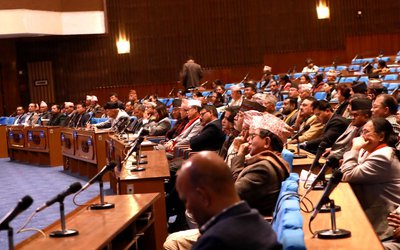
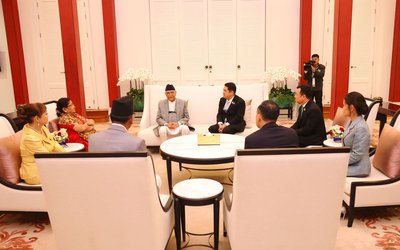
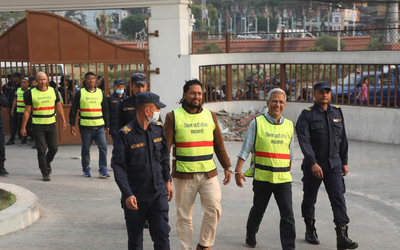
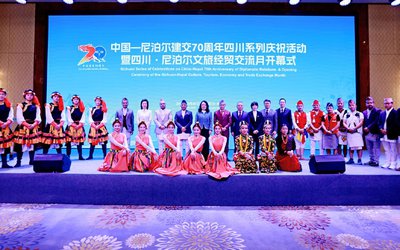
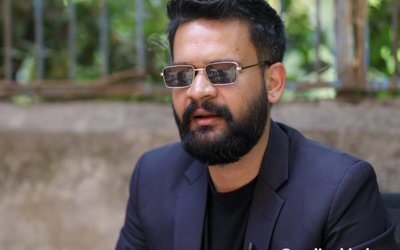
On a warm Tuesday morning , amidst the sound of clanging temple bells, people make their way in and out of the Mahankal temple in the heart of Kathmandu offering their prayers . Free from the daily hustle and bustle of life and all the religious fervor, the atmosphere just behind the temple is a world apart. A group of ruggedly dressed kids with unkempt hair and unwashed face and with a rather uninviting personality gather. They discuss issues ranging from politics to wresting to the ‘top grade’ weed one of the guys has just brought. Hanging a cross around their neck, they are least concerned about all the goings-on around the Hindu temple. They let out a hearty laugh time and again. One of the guys rudely hits the other one on his head and quickly follows it with a peck on his cheeks.
A young man affectionately watches all this action from a short distance. He walks up to these kids to talk sometimes. He’s got an amicable personality and the dozen odd kids listen to him whenever he speaks. He orders a small chiiya pasal nearby to serve tea to them. Pointing at a young girl who was playing around he tells me, ‘This girl, too, was on the streets a few years back like the other kids here. We successfully rescued her and now she is studying in a school. She’s excelling’. And this is exactly what Juju Kaji, the young man and the organization he has set up, the Heartbeat, has been doing.
‘Heartbeat operates with the objective of reforming and empowering the youths and engage them in social activities. So in one way, we are encouraging the youths and in another way we are working for a social cause’, says Juju, explaining the idea behind his organization. ‘We have focused our work mainly on kids because they are the youths of tomorrow, and an emboldened youth force is integral for the development of any country’. Although Juju has worked for diverse causes, from reforming female drug users to many others he currently focuses his work on street kids.
It all started in 2006. Having studied Fine Arts himself, Juju started selling his artworks to raise funds for the noble cause he wanted to pursue . Be it female drug users, kids in prison or any other underprivileged kids, Juju was keen on helping all. ‘After all, it was in my genes’, he says. His family was involved in a lot of social works and community activities. ‘My mom was uneducated. However this did not bar her from serving her community. I guess that turned out to be my ultimate inspiration’, he says proudly.
After formally registering the organization in 2009, Heartbeat focused its work specifically on the street kids. So why street kids? ‘This is one area which I felt was untouched upon. There are a lot of orphanages, old age homes and organizations for the under-privileged. But I found almost none which worked genuinely for the kids.’ He was also touched by their poor condition; they had no proper place to sleep, no regular food to eat and no good clothes to wear. He admits that there are quite a few NGOs and INGOs claiming to work for them, but they do so to seek money from donor agencies. They are not involved in the grass-root level as Juju is. Along with a few of his friends he then initiated numerous activities to support the kids.
However, it was not an easy task. Explaining the initial hurdles, Juju says, ‘Finding an office turned out to be a herculean task. People would not rent us places as we were working for street children. They thought it would be too risky.’ One of the major problems he faced was of finance. Fund was difficult to gather and the organization had had to struggle a lot financially.
Initially Juju faced problems at home. Although his family was involved in social works, they were a bit apprehensive – understandably so -- when they found out he wanted to follow in their footsteps. ‘It’s a dream of every parent to see their children study, have regular job and settle down.’ At a time when everyone was going abroad and studying, Juju’s decision to stay back and work for the society didn’t go down well with the family. But it didn’t take long for them to understand that the young guy had the same family blood. Now, he considers them as one of his biggest supporters in what can be described as a huge charity mission.
Coming back to Heartbeat again, Juju talks about how the organization has been providing help to the needy. Firstly, every Tuesdays and Fridays Juju visits the street kids in Mahankal, Durbarmarg, Basantapur and other areas and provides them tea along with banana/biscuit/doughnut. There, he talks to the kids and listens to them. He’s become a brotherly figure to all. Heartbeat has also been able to pick up quite a few children from the street and sponsor them so that they get good education and do not have to return to the streets again. They are provided with books, pen and copy and other educational materials. Juju has also provided entrepreneur skills to a few street youths who have ended up opening their own tea shops or other small businesses. He gives me an example of street kids in Durbarmarg, who work as ragpickers and are capable of earning a little income on their own. Also on selected days, he calls up the kids to his office and organizes movie screenings for them. The main idea is to help them change; to show them a life they have been deprived of, says Juju.
‘I agree it is not possible to uplift them all but we can at least make a change’ he tells me. ‘We are also working on preventing kids who come from broken families and from rural areas and are highly vulnerable from ending up on streets’. His objective is also to bring about a change in the thinking of the people towards these kids. ‘Yes, a lot of them are involved in crime but not all. Let us take an example of the ones who are working as rag-pickers. They are an integral part of the society. If they stopped their work, imagine what would our streets look like?’ But what about the drug-using problem? ‘See, it is not possible to cure all. But we do provide them with an opportunity; an opportunity to change. Many who are not deeply addicted have come out of the habit and have gone on to study well, he tells me giving some examples.
Juju also says that the organization doesn’t have to struggle with finance now unlike in the past. As Heartbeat has been gaining the societal recognition through media and the word of mouth, a lot of people have come forward to help, he says. He is even more pleased because many young people have been contributing money and other help. ‘Just a while back a couple of students came to donate their lunch money’ he says. ‘It’s a big thing for today’s youth to do that’.
With so much of workload on his shoulders, I ask Juju, who is also involved in a lot of youth projects, how much he has had to sacrifice and how content he is. ‘I work almost 18 hours every day, spending most of the time on the streets. You can make the sacrifice and still be happy – in fact, happier that many.’ He has sometimes faced threat to own life. But Juju wholeheartedly says that he is hundred percent content. ‘It’a humanitarian work. I’m glad that I’m helping transform lives and at least contributing something to my society’ he adds. ‘ Anyone can go for a nine to five regular job, but I believe it takes real courage to choose the road less travelled.’
So how does he plan to go ahead? ‘We will obviously continue with whatever we have been doing. But one area we will focus in the coming years is the advocacy for street children. They are not provided with citizenship and we will work at the policy level so that they they get what they deserve. And what would one need to do to help the organization? ‘We can be contacted through our website (www.heart-beat.org) and also through our facebook page’.







